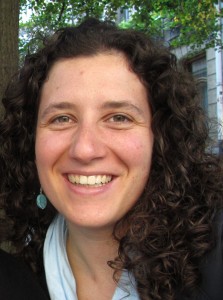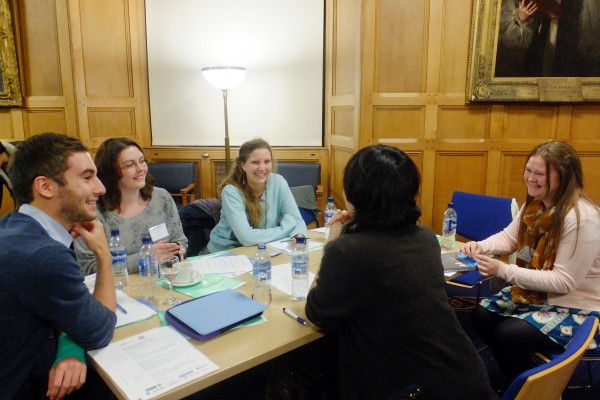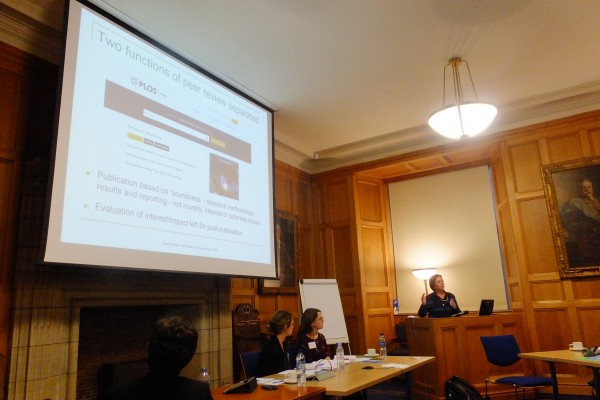Sense About Science’s peer review workshop at St Andrews
| 13 January, 2015 | Guest Author |
|

|
 F1000Research is one of the partners of Sense About Science’s “Nuts and Bolts” peer review workshops. Below is a report from the most recent workshop, written by Anna Cupani. Anna is working on her PhD in Chemical Engineering at Imperial College, London in a joint collaboration with a Belgian research institute, VITO. She is interested in science communication and is member of Voice of Young Science.
F1000Research is one of the partners of Sense About Science’s “Nuts and Bolts” peer review workshops. Below is a report from the most recent workshop, written by Anna Cupani. Anna is working on her PhD in Chemical Engineering at Imperial College, London in a joint collaboration with a Belgian research institute, VITO. She is interested in science communication and is member of Voice of Young Science.
Peer review.
We know what it’s about and as researchers we also agree on its benefits; we recognize the importance of the careful scrutiny of any article that reaches the press. We perceive it as essential to confirm the validity of the study and the reliability of the results reported and we agree it is good practice.
At the same time, we all experience the pressure to publish as much as possible, in the shortest time possible and in competition for funding and visibility (“publish or perish”). As a result, slips and errors are impossible to avoid; researchers are –at the end of the day – human beings. So how can we make the most of the peer review practice within the scientific community?
For researchers in the early stage of their career, the entire peer review process is often seen as vital because we want our work to be recognized by experts in the field. However, at the same time it is somehow obscure as if beyond our complete grasp. An interesting opportunity to make sense of it and learn how peer review can benefit both the authors and the reviewers was offered by the workshop “Peer Review: the Nuts and Bolts”. It was organised by Sense About Science and held on 21 November 2014, at the University of St Andrews.

During the session, there were four presentations from the panelists as well as time for questions and discussion among the participants (something I personally find extremely useful). PhD students and more experienced researchers were able to raise their concerns and doubts about publishing and peer reviewing. Stephanie Harriman, Medical Editor, BioMed Central, gave an overview about the basics behind the publication process. It was interesting to learn that although the comments from the reviewers definitely play a role in the decision of whether or not to publish a paper, the editor always has the last word. Having an insight into the entire publishing path showed once again how the primary aim of the reviewing process is to increase the quality of the published scientific material. It was reported how the vast majority of researchers felt that their work improved after going through such a revision, an opinion confirmed by many of the participants to the workshop.
Irene Hames, editorial consultant and Committee on Publication Ethics (COPE) alumnus, spoke about the changes in the peer review system and explained how they could provide different advantages. For example, making the names of the reviewers known could have a beneficial impact on the quality of the comments by making them accountable and thus encouraging constructive remarks. On the other hand, anonymity sometimes helps the reviewers who can then feel less intimidated and free to be critical. Talking about reviewers it came as a bit of a surprise, for me at least, to find that early career researchers (ECRs) are actually considered potentially interesting reviewers by the editors despite their maybe limited experience. One of the main concerns among the participants was exactly this: how can I know if I am competent/experienced/expert enough to review a paper submitted for publication? And how do I learn to review a paper? Irene’s suggestion was to not be afraid to ask for clarification or support from the editor if we feel our tasks are not clear. Very often the editor will ask for more than one review anyway.

Professor Verity Brown, from St Andrews University and Editor in Chief of the journal Neuroscience and Biobehavioral Reviews explained what kind of papers are likely to find a place on her Journal (“we are a reviews journal, meaning we publish… reviews!”) and what she looks for in a good reviewer. The best suggestions were to be accurate and precise in the comments (as they are meant to help the authors to clarify their work), to state what goes beyond reviewer expertise and for which he or she is not taking responsibility, to respect the deadlines and be reactive in the response.
In conclusion Sabina Michnowicz, from Sense About Science, showed how knowing a study was peer reviewed can help the public (readers, consumers, citizens…) make better informed and more evidence-based choices.
The take-home message, to sum up the afternoon before an informal chat and a drink, was that ECRs who are willing to peer-review could very well approach the editors both directly or via their supervisors and offer their help. After all, this is a skill that can only really be learned by doing. Furthermore, it is a great opportunity to read about cutting edge research while it is happening and to get in contact with potential colleagues and research partners.
(Photos provided by Anna Cupani and Sense About Science. Used with permission.)

|
